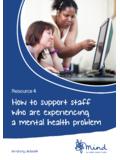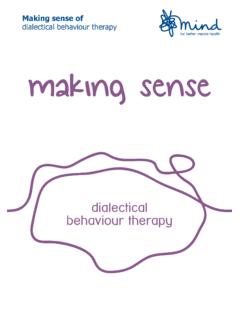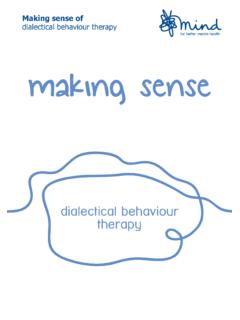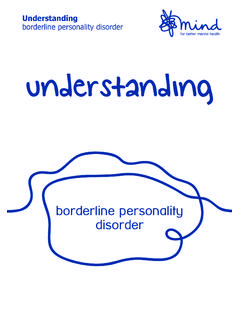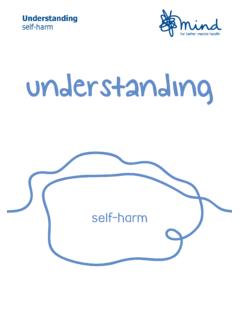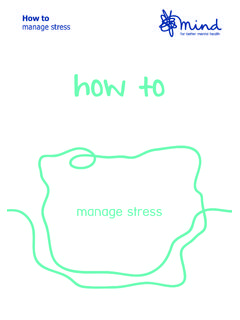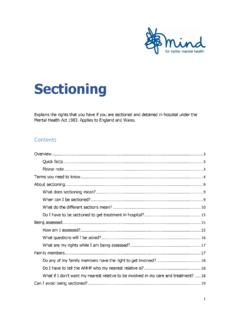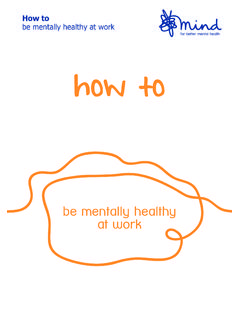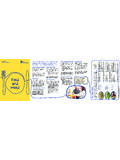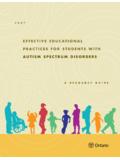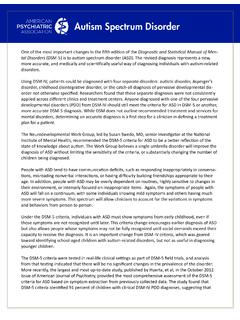Transcription of Supporting people living with autism spectrum disorder …
1 Supporting people living with autism spectrum disorder and mental health problemsA guide for practitioners and providers October 2015 AberystwythLeedsPlymouth and DistrictWe re Mind, the mental health believe no one should have to face a mental health problem alone. We re here for you. Today. Now. We re on your doorstep, on the end of a phone or online. Whether you re stressed, depressed or in crisis. We ll listen, give you support and advice, and fight your corner. And we ll push for a better deal and respect for everyone experiencing a mental health are many terms that are used to describe the range of conditions that fall on the autism spectrum but for the purposes of this document we have chosen to use ASD ( autism spectrum disorder ) to include diagnosis and terms like autism , Asperger syndrome, atypical autism , pervasive developmental disorder not otherwise specified, and autism spectrum I think a lot of care is needed to make sure the needs of people with ASD who are not able to communicate their views such as nonverbal people are not lost.
2 I have experienced services that treat mental health and ASD as completely separate issues and both services seem fearful of people with the other condition. I am just me a whole person with my own unique personality, rather than a set of symptoms which can be easily recognised to one of my conditions . The reliance on carers and professional views about my unmet needs, makes me want to shout that s not what it s like when they describe or interpret what they think I am thinking and feeling. It also seems that the attention is only on children with ASD like if one could grow out of autism as you become older. As a result most services and interventions are designed for children, when obviously what is appropriate for a child at school can be very different for an adult like me. Lucy lives with Asperger s syndrome and borderline personality s storyWe are grateful to Mind for putting together this toolkit for mental health services to help support people on the autism spectrum .
3 Although autism is not a mental health condition, people on the autism spectrum are more vulnerable to mental health problems. Research indicates that 70 per cent of children with autism develop mental health problems, while 16 35 per cent of autistic adults have a comorbid psychiatric disorder . It is vital that, when mental health problems arise, mental health professionals and providers are able to give high quality support that works for people on the autism spectrum . We hope this toolkit gives those professionals some of the guidance they need to make this Lambert, Head of PolicyNational Autistic SocietyWe are pleased that Mind is focussing on mental health difficulties in autism . When Autistica recently consulted with 1000 individuals and families, they identified support with mental health as their top priority, so this tool is clearly responding to the community s needs. It is reassuring that the tool was developed with those on the autism spectrum , and acknowledges that everyone is different so benefits from individualised support.
4 We look forward to working with Mind, other autism and mental health charities, and the government to ensure effective, joined-up support gives individuals with autism the best possible opportunities in Cusack, Research Director AutisticaIt was a pleasure reviewing this comprehensive document. Wirral autistic society is always keen to promote partnerships that improve outcomes for people with autism . We hope this toolkit will improve the quality of mental health services by putting autism specific strategies and approaches at the forefront of discussions on co Bush, CEOY vonne Crowhurst, Head of autism PracticeWirral Autistic SocietySection 1: About this guide 7 Why we re involved 7 The purpose of this guide 7 Key features 8 Future plans and development 8 Consulting with people with ASD 9 Section 2: Developing the social 11 skills of people with ASD 1. Set the scene 112. Communication 123. Emotional regulation 17 Section 3: Being well at work 25 Employment support course 25 Valuing different kinds of Minds 26 Section 4: Conclusion 28 Appendices 29 Appendix 1: World caf approach to 29 consulting people with ASD Appendix 2: Mood wheel templates 30 Appendix 3: Useful resources 31 Appendix 4: Terminology 32 Endnotes 35 ContentsIt s been great having somewhere to go where you re not the weird one; somewhere you can drop the cloak of pretence when you walk in the door.
5 The group is somewhere I can go and talk about how I experience the world and know that others, even if their experiences are not exactly the same, will not judge me. In a world designed for people who are not like me, having a small space carved out in the week for people who are, feels a bit like coming people living with autism spectrum disorder and mental health problems 7 Over the past few years awareness around Autistic spectrum disorders (ASD) has been raised and both the2 UK and Welsh Governments3 have written strategies to enable this group to get the help and support needed to live successful and happy expectations being raised and diagnosis becoming easier to access there are more people who have come to realise they have this condition, and whilst both governments have strategies in place to support people , in reality often services are either not up and running or they are to this the slogan Nothing about us without us, 4 did not appear to be applied to this group and many decisions have been made using one or two individuals on the spectrum .
6 One of the most significant comments from over 120 people we consulted with is no one consulted with me about my needs , and why is it always professionals and carers who are asked how my condition affects me It became apparent that because this condition is a social and communication disability, the people affected were and still are not being involved in service design and we re involvedEvidence from our two year project highlighted that people with Autistic spectrum disorders (ASD) are particularly vulnerable to developing mental health problems. We also found out that existing services tend to treat people either for their ASD or for their mental health problems, failing to recognise the complex dynamic between the key message we are trying to promote is that mental health problems faced by people with ASD may not be directly linked to their diagnosis. Service providers must be aware of the implications in terms of how the person will interact with the physical environment as well as with other research highlighted that about 70 per cent of people with ASD are at risk of suffering from depression and severe anxiety.
7 Our consultations with over 120 people on the spectrum confirmed that though the diagnosis helps to make sense of things and understand their situation, specific support is still lacking and information already available is not easily accessible to people with few mental health services providing specialist support for adults with ASD in the UK, there is a great need to develop mental health services able to meet the needs of this particular client group in an appropriate and respectful purpose of this guideThis guide was developed in partnership with local Minds and communities in Aberystwyth, Leeds and spectrum disorders are obvious to those who know about them and hidden to those that don t, but they should not be main aim of this guide is to equip mental health providers and professionals with tools that will enable them to offer a service that is inclusive and able to cater for the needs of adults with both ASD and a mental health guide sets outs a series of ways on how improvements to service provision might be 1: About this guide8 Supporting people living with autism spectrum disorder and mental health problemsFuture plans and developmentBased on the response from wider public consultation, there is a clear need for further training and to make more information available to ensure both individuals on the spectrum and services who care for them are equipped to support their meet this demand, Mind s Equality Improvement team in partnership with key local Minds intend to act on four levels: Awareness raising to influence local service improvement.
8 Training for other agencies (wider benefit locally). Awareness raising targeting both professionals (for example, GPs) and individuals. Political level, to influence positive change (for example, new Welsh autism strategy).We will act on the first three levels by developing specific resources that are meaningful, accessible and practical (including communication skills and employment support courses tailored specifically for people with ASD).Consulting with people with ASDQ uite often both mental health providers and professionals tell us they are keen to increase access to mental health support for adults with ASD but need more understanding of their condition and support needs. Consultation with adults with ASD is one of the most effective ways of increasing awareness of ASD and person centred can find out about our world caf approach to consulting people with ASD and the carers in Appendix details about training offered by Mind to support you please contact our Equality Improvement team at people living with autism spectrum disorder and mental health problems 9 Key featuresThis guide offers practical information to improve key aspects of mental health service provision, including handy tips to: help providers consult effectively with users and carers meet sensory needs of people with ASD enhance social and employment unique feature of this guide is based on its development in consultation with people on the spectrum to ensure its representative of their needs.
9 This also led to the decision of focusing on social skills and employment in particular, as these topics were the most popular amongst people we consulted. Practical guidance and tools around these two areas are contained in section two and section three of this revealed that most of the consultations about this group of people was undertaken with carers or professionals and not with people with ASD. This has caused mistrust and frustration for people with ASD as the solutions and services tended to meet the needs of carers and professionals rather than those who need services. That s why we felt it was particularly important for providers to hear the voices of people with ASD hardest thing about living with autism and bipolar is that most people remember me by my meltdowns rather than what I m good at. It upsets me because I m more than a person with problems and I wish people will just see people living with autism spectrum disorder and mental health problems 11 Often people with ASD are defined by society as people who prefer to withdraw from society and not in need of friends.
10 Most people with ASD who have been consulted with have shared that this is not the case. Our consultation demonstrated that having a social and communication difficulty made it harder for people on the spectrum to socialise but this did not mean they did not want to is important to recognise that we tend to focus on the challenges of ASD rather than its strengths. Many people on the spectrum told us they would like support to be offered in a way that enables them to use their strengths to develop positive social Set the sceneWhen you re meeting with people with ASD, it s useful to have certain things in on ASD time Some people with ASD take longer to process information and answer questions: you will need to leave enough time to allow them to respond. This might mean leaving extra time for consultation especially for topics that might require a more lengthy discussion (providing accessible written information and allowing for written answers might be good practice.)
